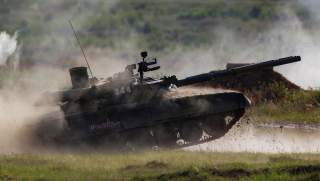Russia's 'New' Tactics Promise to Make Russian Tanks Unstoppable
Especially against 'jihad-mobiles.'
Key Point: Rotating tanks in and out of the firing line, rapid fire shooting and switching between alternate firing positions have been standard practice since World War II (the Russians would have learned this the hard way at the hands of the Germans).
“Tank trousers” and “tank carousels” are among the new tactics that Russian tank crews are using, according to Russian media.
In an era of localized conflicts without clear front lines, jihad-mobiles equipped with anti-tank guns and IEDs, the idea of large tank armies facing off along vast fronts has become a thing of the past,” writes Sputnik News, which described the visit of a journalist from the Rossiya Segodnya news agency to witness exercises of T-72 tanks of the 20th Guards Combined Arms Army.
“It allows us to fire over an unlimited time period,” said Captain Roman Schegolev, a Russian tank company commander. “There can be three, six, nine or more machines. They move uninterrupted in a circular motion, one pummeling the enemy, the other moving to the rear and reloading, the third preparing to enter firing position, and so on. Non-stop shooting. Just make sure to feed the shells.”
Russian tanks will blanket the enemy by firing eight to ten rounds a minute, which they believe will eventually force to return fire and reveal their position. “Imagine tanks shooting for ten, twenty, thirty minutes at a time without a break,” Schegolev said. “On the other side they will break down and open return fire, revealing their armament. Then our disguised sniper tanks with specially trained crews step into action. They quickly and efficiently strike the identified targets.”
Schegolev added the carousel tactic is possible because the T-72 has an autoloader, which gives it an advantage over a manually-loaded M-1 Abrams.
“The tank carousel has been a particularly effective tactic during the Syrian Army’s operations in the country’s geographic conditions of earthen and sand parapets,” according to Sputnik News.
Here, tanks can move along the parapet and, when they reach an opening, shoot, quickly concealing themselves back behind the embankment. So long as they remain in constant motion, it becomes almost impossible to aim at or hit them. Furthermore, to deceive the enemy, the commander can choose which opening to fire from at random, giving the impression there are more tanks deployed than in reality. Openings can be created using engineering equipment, and if necessary, by the crew itself.”
Another Russian tactic is called “tank trousers.” This involves “tanks alternating fire between two trenches, without staying in one position for more than a few seconds,” according to Sputnik News. “The tank enters the trench, fires, kicks into reverse and moves to the next. Enemy anti-tank weapons don’t have time to react.”
Sputnik News also described other tactics, such as using tanks for shoot-and-scoot indirect fire: the vehicles fire their cannon like howitzers at targets they can’t see, and then quickly move to a new firing position before enemy fire can target their position. “Russian tankmen have honed the skill of their plunging fire considerably; at a distance of 8 kilometers, high explosive shells hit within 15 to 20 meters of their target,” Sputnik News said.
This isn’t the first time that Russia has claimed to devised innovative armor tactics. Earlier this year, Sputnik News ran a piece on how Russian tanks will pretend to be artillery pieces. The idea is to lure the enemy artillery into shelling them, but leave the area before the shells arrive, while Russian artillery blasts the enemy guns that have foolishly revealed their position.
What’s interesting here isn’t the tactics themselves, but rather that Russia is trumpeting them as innovative. Rotating tanks in and out of the firing line, rapid fire shooting and switching between alternate firing positions have been standard practice since World War II (the Russians would have learned this the hard way at the hands of the Germans). These are tactics that American, British, Israeli and other tank crews would be familiar with.
Tanks may differ between nations. But often tactics are the same.
Michael Peck is a contributing writer for the National Interest. He can be found on Twitter and Facebook.
This article first appeared in July 2018. It is being republished due to reader interest.
Image: Reuters.

